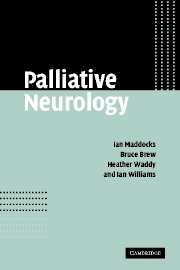Book contents
- Frontmatter
- Contents
- Foreword
- Note on drugs and abbreviations
- Section I Palliative Management
- Section II Major discomforts in advanced neurological illness
- 1 Fatigue
- 2 Problems with muscles and movement
- 3 Bulbar symptoms
- 4 Respiratory symptoms
- 5 Gastrointestinal symptoms
- 6 Urological symptoms
- 7 Pain
- 8 Cognitive, behavioural and psychological symptoms
- 9 Miscellaneous symptoms
- Section III Major neurological conditions requiring palliation
- Section IV Ethical issues
- Section V Appendices
- Index
1 - Fatigue
from Section II - Major discomforts in advanced neurological illness
Published online by Cambridge University Press: 08 January 2010
- Frontmatter
- Contents
- Foreword
- Note on drugs and abbreviations
- Section I Palliative Management
- Section II Major discomforts in advanced neurological illness
- 1 Fatigue
- 2 Problems with muscles and movement
- 3 Bulbar symptoms
- 4 Respiratory symptoms
- 5 Gastrointestinal symptoms
- 6 Urological symptoms
- 7 Pain
- 8 Cognitive, behavioural and psychological symptoms
- 9 Miscellaneous symptoms
- Section III Major neurological conditions requiring palliation
- Section IV Ethical issues
- Section V Appendices
- Index
Summary
Fatigue is ‘a subjective lack of physical and/or mental energy that is perceived by the individual or caregiver to interfere with usual and desired activities’. It refers most appropriately to circumstances in which effort of any kind is exhausting, or is unable to be sustained for more than a short period.
A differential diagnosis of fatigue will endeavour to clarify contributory elements that are reversible, and will consider the following:
relapse of disease,
drug treatments,
prolonged inactivity,
cachexia,
pain,
anaemia,
sleep disturbance,
depressed mood,
metabolic disorders,
stress,
fever.
Loss of energy and fatigue are major symptoms of depression, and may be helped by antidepressant medication (see Depression in Chapter 8 of this section, p. 114). Many drug treatments underlie persistent fatigue: anxiolytics, drugs for spasticity, anti-epileptics and interferon-beta. The correction of anaemia by blood transfusion or erythropoietin may improve well-being. The inflammatory reactions associated with solid cancers cause fatigue and may respond to corticosteroids with improved feelings of energy and capacity and a brighter mood.
Whereas weakness can be measured with simple assessments of muscle strength, fatigue, like pain, is a highly subjective discomfort, difficult to assess objectively and difficult to measure, though scales and symptom inventories have been devised which assist monitoring of progress, particularly in the one individual.
There are few specific therapies that lessen established fatigue:
caffeine 100 mg tab. up to 4/day helps some individuals;
[…]
- Type
- Chapter
- Information
- Palliative Neurology , pp. 45 - 46Publisher: Cambridge University PressPrint publication year: 2005



